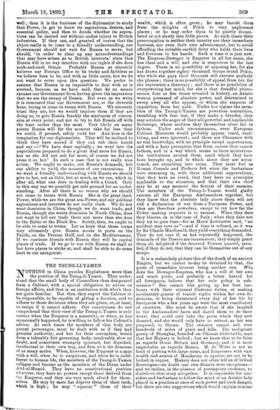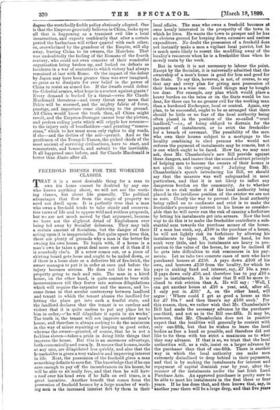THE TSUNG-LLYAMEN. N OTHING in China puzzles Englishmen more than the
position of the Tsung-li-Yamen. They under- stand that the small body of Councillors thus designated form a Cabinet, with a special obligation to advise on foreign affairs, and that is an institution with which they are quite familiar. But then they expect the Cabinet to be responsible, to be capable of giving a decision, and to adhere to those decisions when they are given, or, at least, to resign if it cannot adhere. Our countrymen do not comprehend that their view of the Tsung-li-Yamen is only correct when the Emperor is a nonentity, or when, as has occasionally happened, he is willing to follow his Cabinet's advice. At such times the members of that body are potent personages, must be dealt with as if they had genuine authority, and but for their corruption, would form a tolerably fair governing body, intolerably slow no doubt, and sometimes strangely ignorant, but dignified, intellectual in their own way, and firm with the firmness of as many mules. When, however, the Emperor is a man with a will, when he is suspicious, and when he is indif- ferent to human life, the members of the Tsung-li-Yamen collapse and become as the members of the Divan under Abd-ul-Hamid. They have no constitutional position whatever, they have no powers except those derived from the Emperor, and they are very much afraid for them- selves. He may by mere fiat deprive them of their rank, which is high ; he may " squeeze " them of their wealth, which is often great ; he may banish them from the delights of Pekin to very unpleasant places ; or he may order them to be quietly decapi- tated or cut slowly into little pieces. At such times their preoccupation is neither their country nor their immediate business, nor even their own advancement, but to avoid offending the irritable earthly deity who holds their lives and fortunes in his hands. Such a time it is just now. The Empress-Dowager is Emperor in all but name, she has ideas and a will, and she is suspicious to the last degree. There is no possibility of opposing her, for she has drawn together eighty thousand troops round Pekin, who while she pays their Generals will execute anybody she pleases ; there is no possibility of appeal from her, for she represents a theocracy ; and there is no possibility of overpowering her mind, for she is that dreadful pheno- menon four or five times revealed in history, an Asiatic woman possessed of absolute power, and determined to sweep away all who oppose, or whom she suspects of opposition, from her path. Under her regime the mem- bers of the Tsung-li-Yamen are powerless nonentities, trembling with fear lest, if they make a blunder, they may awaken the anger of their all-powerful and implacable Sovereign, whose motives they themselves often fail to fathom. -Under such circumstances, even European Cabinet Ministers would probably appear timid, vacil- lating, and even ignorant; and these are Chinamen with no real knowledge, with no principle except opportunism, and with a hazy perception that from causes they cannot fathom, and in a way which seems to them mysterious the institutions around them, amid which they hay, been brought up, and to which alone they are accus tomed, are crumbling into ruins. They must feel as Roman Consuls and Prefects felt when the barbarians were swarming in, with these additional aggravations, that they have no creed, that they have no principles applicable to the situation, and that their own chief may be at any moment the fiercest of their enemies. The members of the Tsung-li-Yamen would gladly execute all the European Ambassadors together, but they know that the absolute lady above them will not risk a declaration of war from a European Power, and they are therefore powerless, except to try how far the Power making requests is in earnest. When they dare they bluster, as in the case of Italy ; when they dare not they try to gain time—for as Marie Antoinette said, "an accident may save us "—and if time is refused, as it was by Sir Claude Macdonald, they yield everything demanded. They do not care if, as has repeatedly happened, the demands of the Powers are inconsistent; they simply grant them all, delighted if the deceived Powers quarrel, satis- fied, if they do not, that they can lie themselves out of any scrape.
It is a melancholy picture this of the death of an ancient Empire, but we cannot to-day be detained by that, the point of immediate interest being another one. Why does the Dowager-Empress, who has a will of her own and much pride, and probably a bitter hatred for all foreigners, believe that her only policy is sub- mission ? She cannot like giving up her best har- bours with their external Customs duties, or making involuntary grants of transit rights within her own do- minions, or being threatened every day of her life by foreigners who a few years ago were the most conciliatory of courtiers. She must be aware that if she laughed in the Ambassadors' faces and dared them to do their worst, they could only take the ports which they now demand, and she would only have to retreat, as her son proposed, to Shensi. The cruisers cannot sail over hundreds of miles of plain and hills. The malignant gossip of Shanghai, founded on Chinese tittle-tattle, says that her Majesty is bribed ; but we know that to be false as regards Great Britain and Germany, and it is most improbable as regards Russia. M. de Witte is not so fond of parting with large sums, and Empresses with vast wealth and armies of Mandarins to squeeze are not to be bribed in copper. History does not often tell us of bribed Sovereigns—no doubt our own Stuarts were exceptions— and we incline, in the absence of peremptory evidence, to disbelieve that story altogether. It is impossible for out- siders and barbarians to follow the mind of an Asiatic lady placed in a position at once of such power and such danger, but there are two suggestions which would explain in some degree the wretchedly feeble policy obviously adopted. One is that the Empress genuinely believes in China, looks upon all that is happening as a transient evil like a local insurrection, and expects confidently that after a certain period the barbarians will either quarrel with each other, or, overwhelmed by the grandeur of the Empire, will slip away, leaving China to its owners, the Manchus. That was undoubtedly the feeling of the Romans of the fourth century, who could not even conceive of their wonderful organisation being broken up, and looked on defeats as incidents in a war of centuries in which victory had always remained at last with Rome. Or the impact of the defeat by Japan may have been greater than was ever imagined, so great as to dissipate for ever belief in the power of China to resist an armed foe. If the dwarfs could defeat the Celestial armies, what hope in a contest against giants ? Every demand is backed by a threat—even Sir Claude Macdonald threatens—and every threat may mean that Pekin will be stormed, and the mighty fabric of force, prestige, and imposture come clattering to the ground. All China would know the truth then, all China might revolt, and the Empress-Dowager cannot bear the picture, and prefers ceding ports which will cripple her revenue— to the injury only of bondholders—and granting "conces- sions," which to her must seem only rights to dig roads, if she—and the deities of the soil—permit. And so the gentlemen of the Tsung-li-Yamen, the picked chiefs of the most ancient of surviving civilisations, have to start, and remonstrate, and beseech, and submit to the inevitable. It all happened once before, and Sir Claude Macdonald is better than Alaric after all.







































 Previous page
Previous page